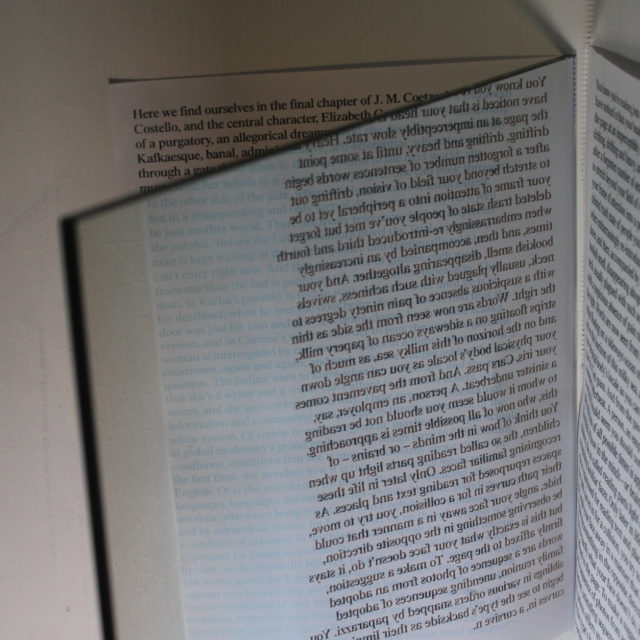
Here we find ourselves in the final chapter of J. M. Coetzee’s Elizabeth Costello, and the central character, Elizabeth Costello, is in something of a purgatory, an allegorical dreamworld she describes as irritatingly Kafkaesque, banal, administrative, self-referential, where to pass through a gate that leads to the next world to the next world, she must state her beliefs to a court and be judged. She can peek through to the other side of the gate, where it is luminous to a small extent, but in a disappointing and only sort-of-divine way, it may very well be just another world. There are many references in this chapter to the parable ‘Before the Law’ in Kafka’s novel the Trial, in which a man is kept waiting at the door of justice and continually told he can’t enter right now. And that a sequence of guards, each more fearsome than the last is guarding the rooms on the other side. The man, in Kafka’s parable, is told to wait, which he does until he is on his deathbed, when he sees the door being shut up and is told that the door was just for him and now it is being closed. So that’s the Kafka version, and in Coetzee’s version in order to pass through the gate the woman is interrogated by cartoonish Judges in a flimsy phantasm of a courtroom, again and again, and each time the Judges asking the same question. The judges want to know what her beliefs are, and she replies that she’s a writer and a writer can’t afford to entertain beliefs, just voices, and she goes on to explain why. These streams of contextual information and extenuating circumstances threaten the spell of the whole system. Of course to enter judgement, maybe even to participate in global modernity’s grand project at all, things have to fulfil certain conditions, conditions that she is umming furiously about. “Not for the first time, she wonders how it is that everyone she meets speaks English. Or is she mistaken? Are these folk in fact speaking other languages, languages unfamiliar to her–Polish, Magyar, Wendish–and are their utterances being translated into English, instantaneously and by miraculous means, for her benefit? Or on the other hand is it a condition of existence in this place that all speak a common tongue, Esperanto for example, and are the sounds that issue from her own lips not, as she deludedly believes, English words but Esperanto words, just as the words the Kapo woman speaks are Esperanto, though the woman may believe they are Polish? She herself, Elizabeth Costello, has no recollection of ever having studied Esperanto, but she could be mistaken, as she has been mistaken about so many things. But why then are the waiters Italian? Or is what she thinks of as their Italian simply Esperanto with an Italian accent and Italian hand gestures?”
(Truncated art catalogue essay…)